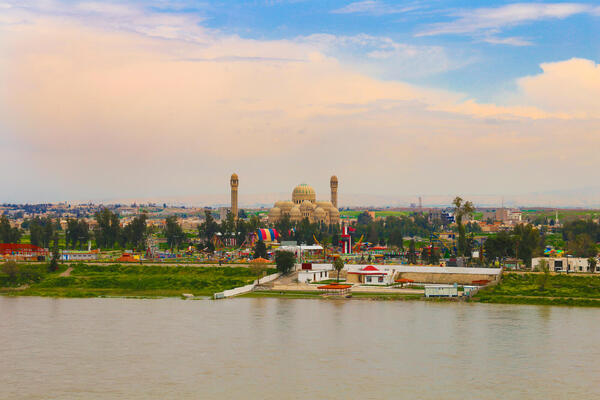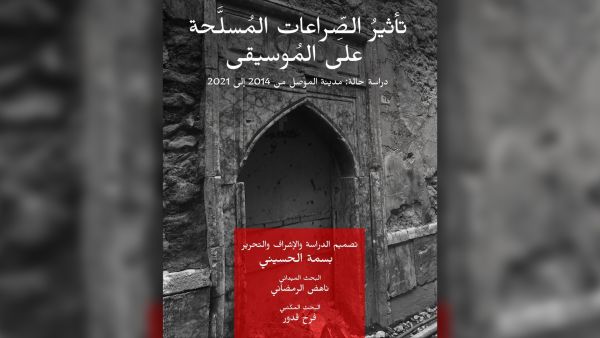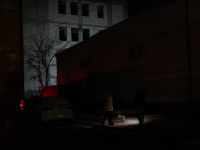By Ruba Hattar
A new study entitled Impact of Armed Conflicts on Music, taking the Iraqi city of Mosul from 2014-2021 as a case study was published by Action for Hope organization.
This study aims to provide reliable sources of information about the condition of production, education, and musical practices in the city of Mosul in 2021, and to provide an objective analysis of the impact of armed conflicts on production, education, and musical practices, according to what happened in the city of Mosul during the past seven years.
The study also aims to provide practical and realistic recommendations to organizations, individuals and companies involved in working in the field of music in areas that have experienced or are undergoing armed conflict.
The study was designed, supervised and edited by Basma El-Husseiny, field research: Nahed AlRamadany, desk research: Farah Kaddour, and supported by The Cultural Protection Fund, The British Council in cooperation with ملتقى الكتاب - Book Forum.
Action for Hope
Action for Hope started in summer 2013 as a pilot program under the umbrella of Culture Resource (Al Mawred Al Thaqafy), the leading pan Arab cultural organization and provider of services and support to the independent cultural field in the region.
The genesis of the project was a trip made by a delegation of 17 Arab artists and cultural activists to the Syrian refugee camps in Kilis, Turkey and to nearby camps near the Syrian border in November 2012.
This diverse group of artists, actors, filmmakers, and writers originally came together with a plan to show the solidarity of the Arab cultural community with the Syrian people in crisis, by bringing donations to the camps, sharing their skills with camp residents through some impromptu cultural workshops or events, and talking to camp residents. This visit was organized independently of any state or institutional support.
Visiting these communities made a deep impact on the members of this delegation, and revealed two essential facts: that displacement into the camps had a dehumanizing and demoralizing effect due to the disintegration of the whole social fabric, and that existing relief efforts were not addressing the whole human cost of the displacement.
Another realization was that while the Syrian refugee camps were “temporary” solutions to an immediate problem, there were also populations within Egypt, and in other countries in the region, that lived in very distressed conditions and were in similar circumstances that could only result in despair, hopelessness and the disintegration of the social fabric, leading to violence, instability and vulnerability to a fundamentalist religious messages.
In early 2015, the Action for Hope cultural relief program and activities were re-formulated to respond to the findings and evaluations of the pilot phase. The most important change after the pilot was to add to the “relief” elements such as cultural relief convoys more sustainable cultural development programs that have a deeper impact on communities and on the arts and culture scene such as the music school, advanced training in video and theater, and the university scholarships in the arts.
After a long partnership Journey in Jordan, Action for Hope was registered as an Association / Branch of foreign Association in 2020 to implement and extend its activities in Amman.
In 2019 the cultural management workshop concept has gone beyond Lebanon to reach Iraq and Sudan and the Music training program has landed in Mosul – Iraq.
Mosul
Mosul is considered to be among the larger and more historically and culturally significant cities of the Arab World. Due to Mosul's strategic location it has traditionally serving as a hub of international commerce and travel. The North Mesopotamian dialect of Arabic, commonly known as Moslawi, is named after the city of Mosul and is widely spoken in the region.
Historically, important products of the area include Mosul marble and oil. Mosul is home to the University of Mosul and its renowned Medical College, one of the largest educational and research centers in the Middle East.
Together with the nearby Nineveh Plains, Mosul is one of the historic centers of the Assyrian people.

In 2008, many Assyrian Christians (about 12,000) fled the city, following a wave of murders and threats against their community. The murder of a dozen Assyrians, threats that others would be murdered unless they converted to Islam, and the destruction of their houses sparked a rapid exodus of the Christian population. Some fled to Syria and Turkey; others were given shelter in churches and monasteries. Accusations were exchanged between Sunni fundamentalists and some Kurdish groups of being behind this new exodus. Some claims linked it to the provincial elections of January 2009, and the related Assyrian Christians' demands for broader representation in the provincial councils.
Mosul was attacked on 4 June 2014. After six days of fighting, on 10 June the Islamic State took over the city during the June 2014 Northern Iraq offensive. By August, the city's new ISIL administration was dysfunctional, with frequent power cuts, a tainted water supply, collapse of infrastructure, and failing health care.







